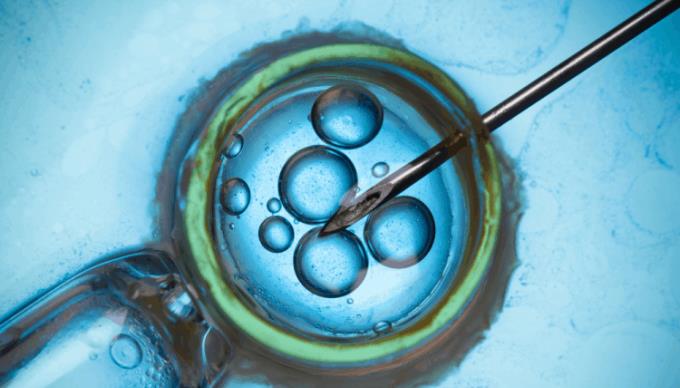Motherhood is a divine ministry that any woman desires. However, in some cases, despite the desire, many women still cannot have children, especially when they have reached menopause. Is pregnancy at menopause really impossible?
Many women are worried about whether they can become pregnant after menopause or not, let aFamilyToday Health answer this question in the article below!
What is menopause?
Menopause is the term used to refer to the period when a woman's ovaries are completely inactive. Menopause is the period that marks the end of the menstrual cycle as well as the reproductive process of a woman. This is the normal stage that every woman goes through in her life.
A woman's ovaries contain a large number of eggs. The menstrual cycle and ovulation cycle are controlled by hormones such as estrogen and progesterone, which are produced in the ovaries. When the ovaries are no longer able to produce eggs, the menstrual cycle ends and menopause begins.
The difference between menopause and perimenopause
The first difference between perimenopause and menopause is menstruation. The female body in the premenopausal period is still able to produce estrogen and still has normal menstrual periods. Menopausal women have missed their period for at least 12 months.
Perimenopause is the period in which the body prepares for menopause, this is seen as the transition between menopause and menopause. Meanwhile, menopause is a clinical condition in which a woman's menstruation has completely ceased.
Perimenopause is a term used to describe the "transition" to menopause, when your body begins to produce less estrogen and progesterone. Your menstrual cycle will become irregular, both in density and duration.
During this period, fluctuating hormone levels can lead to hot flashes and night sweats. However, during menopause, the levels of hormones LH and FSH increase, ovulation also stops completely.
Some women wonder how long the menopause will last. The answer is menopause will last for the rest of your life.
Is it possible to get pregnant at menopause or not?
This is a very common question among women who have entered menopause. During menopause, the ovaries have lost the ability to produce eggs completely, so you are no longer able to become pregnant. Therefore, you do not need to use contraceptive methods without worrying about "getting pregnant".
However, if you have sex indiscriminately without any preventive measures, you could get sexually transmitted diseases like gonorrhea, syphilis, even HIV. So, you should still take some safe measures when having sex.
Sometimes, you can hear stories of women getting pregnant and giving birth when they are 60-70 years old. This may be because these people enter menopause later than others or become pregnant with the help of medicine.
Can a woman become pregnant after menopause with the help of medical science?

In some cases, even though they are postmenopausal, many women still want to have a baby. In this case, although you cannot get pregnant spontaneously, you can still give birth with the help of fertility methods. At this point, doctors can use a number of methods to help you get pregnant:
If you have not had long menopause and your ovaries still have follicles, your doctor may work to stimulate the ovaries (eggs) to grow again. However, according to some studies, the embryo developed from the eggs of these women often develops abnormalities in the chromosomes, cannot develop into a fetus or can lead to defects in children.
If you have been menopausal for too long, the ovaries will shrink slowly, the follicles will also shrink in size so you cannot perform stimulation. Then, if you want to become pregnant, the only way is to perform in vitro fertilization. As medicine grows, women have become accustomed to "freezing eggs", which is a method of preserving eggs at low temperatures for a long time. Eggs after being thawed will be fertilized in a test tube together with sperm of the husband. In the absence of storing eggs, you can also artificially inseminate by asking for donor eggs.
Plus, you'll have to do some hormone therapy to get your body ready for fertilization and pregnancy. However, your doctor will monitor and decide if your health is suitable for in vitro fertilization. Therefore, you need to consult an obstetrician before deciding to perform in vitro fertilization after menopause.
Is it possible to reverse menopause?
In fact, there is still nothing medicine can be done to reverse menopause. Today, however, doctors can take a number of impact measures to slow this process down.
The use of platelet-rich plasma (PRP) is one of the treatments that has caught the attention of clinical researchers. PRP is rich in cytokines and hormones, which promise to help restore the ovaries in a certain period of time. However, this method still needs more clinical research.
The risks that pregnant women may face during menopause pregnancy
As a woman's age increases, so do the risks encountered during pregnancy. Compared to younger women, you may face a greater risk if you become pregnant by the age of 35, including:
During in vitro fertilization, you may experience a multiple pregnancy (two or more pregnancies). This can lead to a low weight, premature birth, or a difficult birth.
Stillbirth or miscarriage.
Gestational diabetes, which in turn can cause health problems for both mother and baby.
Older women often do not have the strength to give birth normally, but must have a cesarean section.
High blood pressure, this is one of the risks you can face during pregnancy at menopause. If you are diagnosed with high blood pressure during pregnancy, your doctor will monitor and give you medications to prevent future complications.
Condition susceptible to placenta praevia (placenta praevia), this phenomenon can cause bleeding and should be treated with medicine.
In addition to affecting the mother's health and the course of pregnancy, babies born to pregnant mothers after menopause can have dangerous complications such as:
Preterm or low birth weight
Risk of birth defects such as Down syndrome, musculoskeletal defects or diseases related to the lungs or heart. The incidence of birth defects in these cases is often very high, so mothers need to conduct prenatal screening diagnostic measures to detect birth defects in their babies and consider whether they should keep. pregnant or not.
Children are susceptible to developmental delays or cognitive problems.
What do you need to prepare for pregnancy after menopause?

Pregnancy is an important stage and requires a lot of preparation. Older women, especially, are at greater risk of having more dangerous complications during pregnancy and labor than normal people, so you need to prepare more carefully to have a safe pregnancy. You can do the following to increase your chances of conceiving and reduce the risk of pregnancy during menopause:
Before thinking of getting pregnant, the first thing you need to do is ensure your health. Take a vitamin and folic acid supplement three months before you plan to become pregnant . You can also start taking more vitamin D and calcium, which are important in the formation of bones and teeth and ensuring fetal development.
Try to maintain a body mass index (BMI) between 18.5 and 24.9% before trying to get pregnant. Obesity is one of the factors that greatly affect your pregnancy, especially for postmenopausal women. Consider eating a diet high in protein and reducing your calorie intake to ensure your weight and BMI is right. Avoid foods high in saturated fat, sugar and canned foods.
You need to see a doctor to perform some tests such as mammograms, PAP tests, hemoglobin, lipids, tests for sexually transmitted diseases and diabetes ... These tests It is very helpful in finding out the risk factors that may affect your pregnancy.
When women reach menopause, they are no longer able to become pregnant naturally. If you want to have a baby at this age, you can turn to medical methods such as in vitro fertilization or egg stimulation.
However, when planning to become pregnant, you should see your doctor for advice and performing the necessary tests to ensure that your health is suitable for pregnancy. Pregnancy after menopause has many potential risks, so mothers need to prepare well mentally as well as health.













